Congratulations on your new arrival! If you’re like most cat owners, you’re probably wondering when to change bedding after a cat gives birth. It’s a good question, and one that doesn’t have a definitive answer. Every cat is different, and will require a different level of care after giving birth. In this article, we’ll discuss the basics of caring for your cat after she has given birth, as well as provide some helpful tips on when to change bedding.
Bedding and some of the issues
One of the most important things to remember when caring for your cat after she has given birth, is to keep her bedding clean. This means changing it often, and washing it regularly. Cats are very clean animals, and will often spend a lot of time grooming themselves. However, they can also be susceptible to infection if their bedding is not kept clean. After giving birth, your cat’s body will be going through a lot of changes. She will be producing milk for her kittens, and will also be shedding the hair that she doesn’t need anymore. This shed hair can end up in her bedding, which can then lead to infection if it’s not cleaned out regularly. [3]
When To Change Bedding After Cat Gives Birth?
The answer to this question depends on a few factors. If your cat is indoor only, you can probably wait until she gives birth and then change the bedding. However, if your cat goes outdoors, it’s best to change the bedding before she gives birth. This will help reduce the risk of infection. Additionally, if your cat has any medical conditions that could be exacerbated by dirty bedding, it’s best to err on the side of caution and change the bedding before her delivery. Finally, if you simply want peace of mind knowing that everything is clean for your new kittens’ arrival, go ahead and change the bedding beforehand! [2]
How Do I Change The Bedding In A Cat’s Nest?
The first thing you need to do is remove the old bedding. You can do this by gently lifting your cat and her kittens out of the nest and setting them in a safe place. Once they are out of the way, take out any soiled bedding and dispose of it properly. If there is any dried blood or other fluids on the bedding, you may need to use a mild detergent to clean it before you can replace it.
Next, you will need to gather some fresh bedding for the nest. You can use anything that is soft and comfortable for your cat, such as towels, blankets, or sheets. Avoid using anything with synthetic fibers, as these can irritate your cat’s skin. Once you have gathered the fresh bedding, you can put it in the nest and gently place your cat and her kittens back inside. [2]
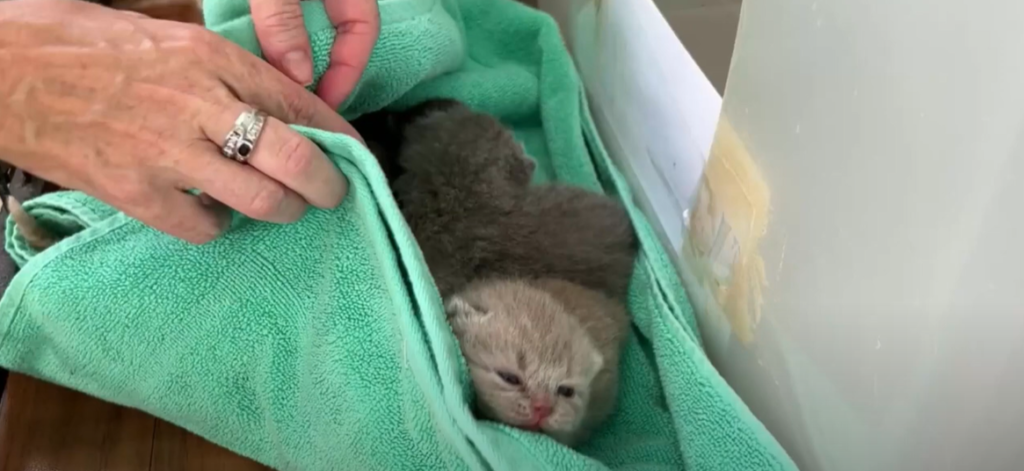
What Is The Best Bedding For Baby Kittens?
Most experts will tell you that the best bedding for baby kittens is actually no bedding at all. A heating pad set to low and covered with a soft, clean towel is really the safest way to go. You can find these pads at most pet stores or online.
If you do use bedding, make sure it’s something washable in case of accidents and that it’s not too fluffy or bulky. The last thing you want is for your kitten to get tangled up in something and not be able to get free. A simple fleece blanket or an old T-shirt cut into strips works well and can be easily washed if needed. [2]
How often should you change newborn kittens’ bedding?
It is generally recommended that you change newborn kittens’ bedding everyday or every other day. This will help to keep them clean and dry and prevent any infections. If you notice that the bedding is wet or soiled, then you should change it immediately. Kittens are very susceptible to infections, so it’s important to keep their environment clean.
If you have more than one kitten, you may need to change the bedding more often. Kittens tend to play and explore their surroundings, which can result in them getting dirty quickly. [4]
Types of cat beds recommended for newborn cats
There are a variety of types of cat beds that can be used for newborn cats. Some people prefer to use a heated bed, others a soft bed with low sides, and still others choose to make their own bed out of blankets or towels.
The important thing is to make sure that the bed is warm and comfortable for the mother and her kittens. It should also be large enough for the mother to move around in so she can keep an eye on her kittens at all times.
Once you have chosen a bed, it is important to change it regularly. This is because the bedding can become soiled with urine and feces very quickly. It is also a good idea to wash the bedding in hot water every week to kill any bacteria that may be present. [3]
Should I clean my cat after she gives birth?
Yes, you should clean your cat after she gives birth. It is important to remove any blood or other fluids from her fur and body to prevent infection. You can use a mild soap and warm water to gently clean her. Be sure to rinse all of the soap off of her body completely.
After you have cleaned your cat, you will need to dry her fur thoroughly. You can use a towel or a hairdryer on the low setting to do this. Be sure not to get her fur too wet or hot while drying it. Once her fur is completely dry, you can brush it out to help keep it looking clean and healthy. [4]
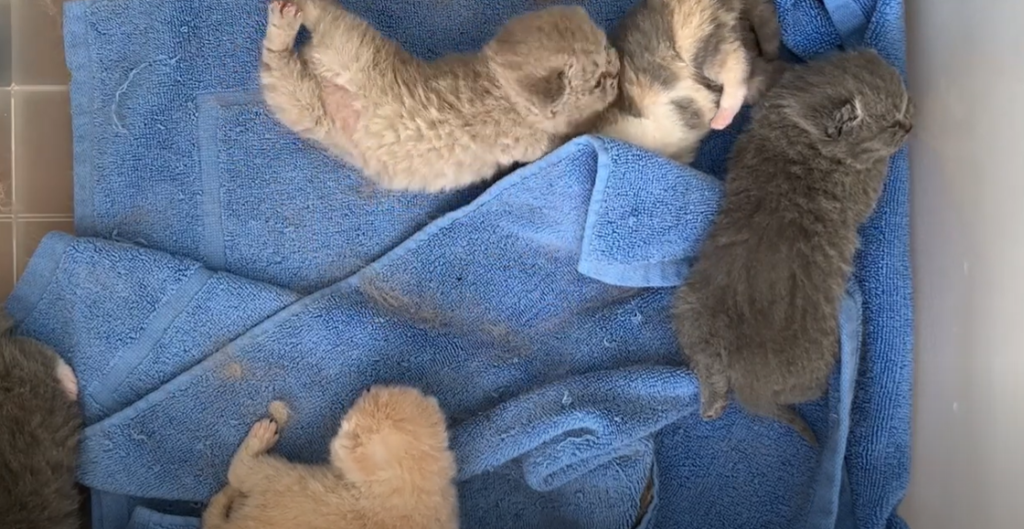
Do Dad cats know their kittens?
It’s a common question asked by new cat parents: Do dad cats know their kittens? The answer is yes, they most certainly do! In fact, research has shown that father cats are very attached to their offspring and play an important role in their development.
So, if you’re wondering whether or not you should let your cat meet his newborn kittens, the answer is definitely yes! It will be a rewarding experience for both of them.
Of course, as with any introduction of new animals, it’s important to do so slowly and carefully to make sure everyone is comfortable. Start by letting your cat smell his kittens from a distance, then gradually allow him to get closer. Once he seems relaxed and interested, you can let him approach and interact with them. [4]
Caring For A Pregnant Mom
Feeding Pregnant Cats
Caring for a pregnant cat is relatively easy, but there are a few things you should keep in mind. First, it’s important to feed your cat a nutritious diet during pregnancy. You can either purchase a commercial food designed specifically for pregnant cats, or speak to your veterinarian about what kind of food to feed your cat. [1]
Your Pregnant Cat’s Environment
The environment in which your pregnant cat lives is important for her health and the health of her kittens. The temperature should be comfortable for her, and there should be no drafts. The litter box should be clean and easily accessible. She will also need a place to eat and drink that is separate from her litter box.
Your cat’s bedding is also important. It should be clean and soft, so she can be comfortable as she gains weight during pregnancy. After she gives birth, you will need to change her bedding more frequently to prevent infection. [1]
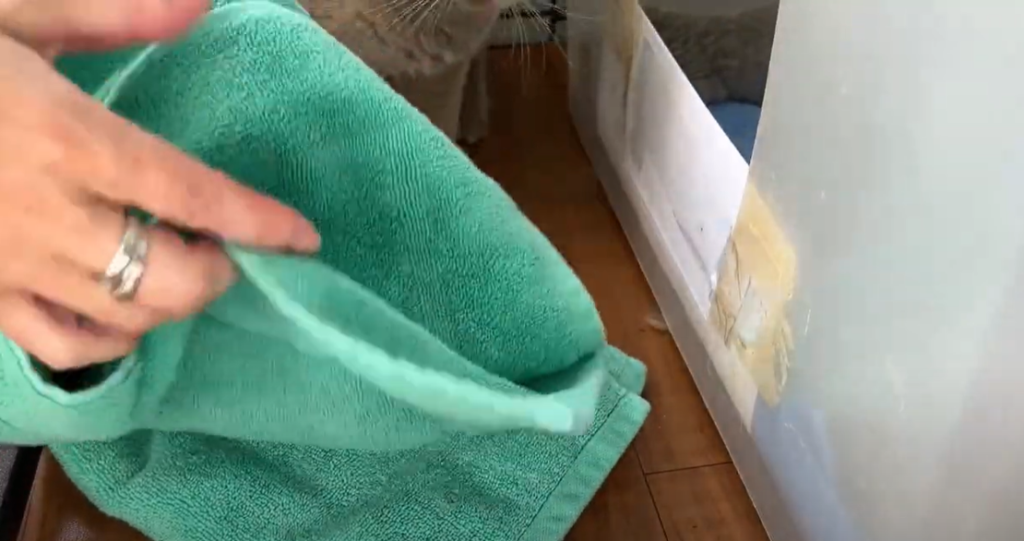
Ready To Give Birth
Once your cat’s water breaks, labor should begin within 12 hours. If your cat has not given birth within 24 hours of her water breaking, or if she shows signs of distress, call your veterinarian immediately.
Once your cat starts giving birth, she will probably have a kitten every 15-20 minutes. The entire birthing process usually takes between three and eight hours. After each kitten is born, the placenta (the sac that held the kitten during pregnancy) will also be expelled. Be sure to count each placenta as it is born, as this will help you keep track of how many kittens your cat has had. [1]
Post-Labor Care
After your cat has given birth, it’s important to provide her with the proper care to ensure a speedy recovery. One of the most important things you can do is keep her environment clean. This means changing her bedding frequently and keeping her litter box clean. Here are some other post-labor care tips:
- Offer your cat small meals often instead of one large meal. This will help her regain her strength gradually.
- Provide plenty of fresh water at all times.
- Give your cat a quiet place to rest and recover away from any loud noises or commotion.
- Keep an eye on your cat’s temperature and call the vet if it drops below 100 degrees Fahrenheit or rises above 103 degrees Fahrenheit.
- Be sure to monitor your cat’s incision site and call the vet if you see any redness, swelling, or discharge.
By following these simple tips, you can help your cat recover quickly and safely from labor. If you have any concerns, always be sure to contact your veterinarian. They will be able to give you specific instructions on how to care for your postpartum cat. [1]
Caring For A Friendly Moms Kittens
Feeding
Once your cat has given birth, it is important to continue to provide her with good nutrition. Nursing mothers need extra calories and nutrients to support their milk production. A nursing mother’s diet should be high in protein and calories, and she should have free access to water at all times. Kittens also need a high-quality diet that is rich in proteins, fats, and essential nutrients. Your veterinarian can recommend an appropriate diet for your nursing mother and her kittens. [1]
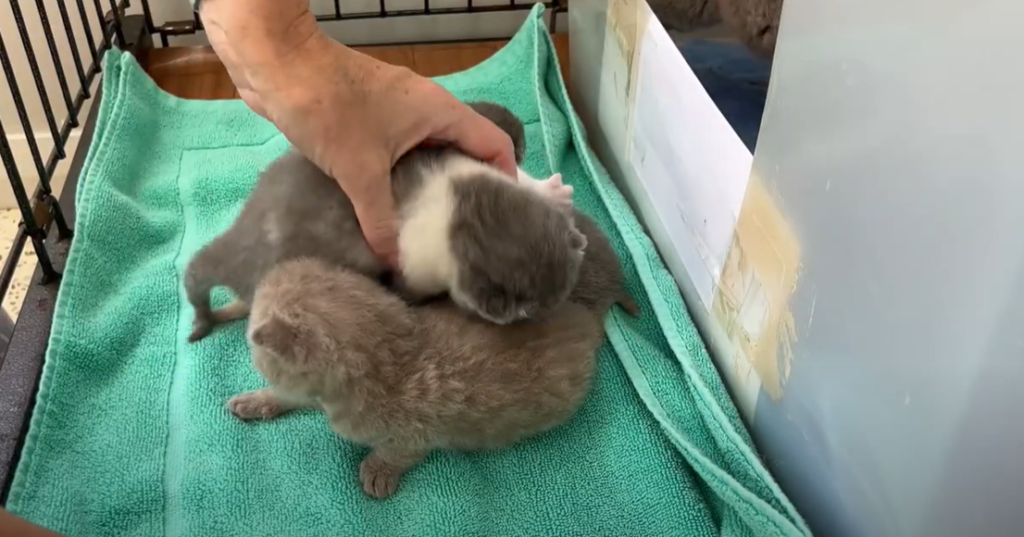
Cleanliness And Litter Box
One of the most important things you can do for your cat after she gives birth is to keep her and her litter box clean. A clean environment will help her heal and feel comfortable, and it will also reduce the risk of infection.
You should scoop the litter box at least once a day, and more often if possible. It’s also a good idea to change the litter completely every week or two. If you use clumping litter, make sure to break up any large clumps before scooping so that they don’t stick to your cat’s fur.
As your cat starts to feel better, she may want to start using the litter box more frequently. If you notice that she’s having trouble using it or that she’s leaving large amounts of urine or feces outside the box, contact your veterinarian. They can help you figure out what’s causing the problem and how to solve it. [1]
Monitoring Health
After your cat gives birth, it’s important to keep a close eye on her health and kittens. If you notice any problems, contact your veterinarian immediately. Kittens are very vulnerable in the first few weeks of life and need their mother to be healthy in order to survive.
One of the most important things you can do for your cat and her kittens is to provide them with a clean and comfortable place to sleep. This means changing the bedding frequently and keeping the area free of dirt and debris. [1]
Socializing The Kittens
If you have other pets in the house, it’s important to introduce them to the new kittens slowly and carefully. The last thing you want is for your cat to feel threatened or stressed in her own home. Start by letting them see and sniff each other through a baby gate or closed door. If all goes well, you can gradually start giving them supervised playtime together.
You should also start socializing your kittens around different types of people, such as men, women, and children. This will help them grow into well-rounded adults who aren’t afraid of unfamiliar faces. [1]
Caring For Feral Moms Kittens
Feral mothers and kittens need a little extra care. Their immune systems are weaker, so they’re more susceptible to disease. They also might not have had the best nutrition while they were pregnant, which can put them at risk for complications during delivery or after the birth.
That’s why it’s important to take them to the vet as soon as possible after they give birth. The vet can assess their health and make sure they’re getting the care they need.
If you have a feral mom and kittens, you should also:
- Check on them often to make sure they’re doing okay
- Keep an eye out for signs of illness or distress
- Give them plenty of food and water
- Keep their litter box clean
If you can’t care for them yourself, there are organizations that can help. The Humane Society is a good resource for finding feral cat programs in your area. [1]
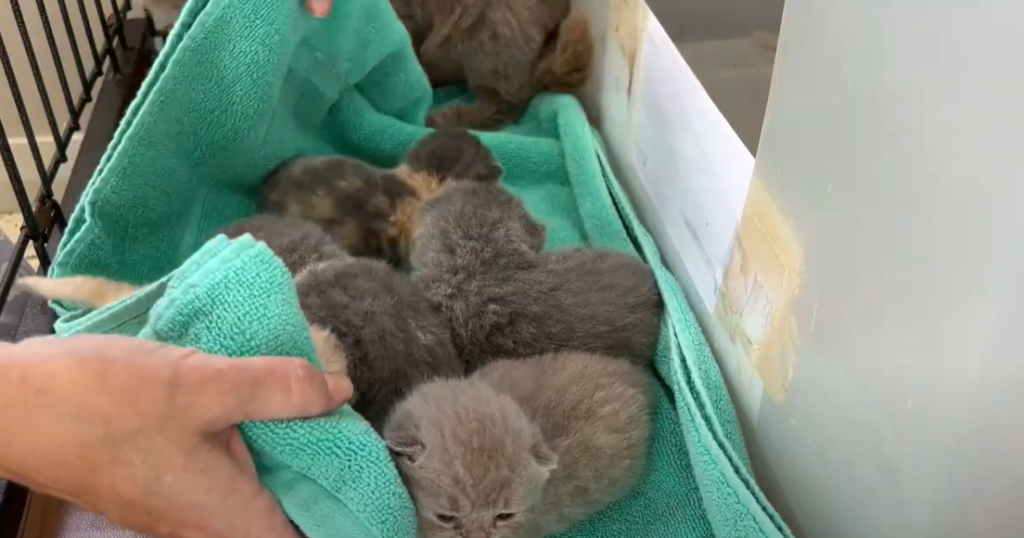
FAQ
How to feed newborn kittens?
Newborn kittens need to be fed every two to three hours, around the clock. If you’re bottle-feeding, use a kitten formula designed for newborns. For the first week or so, it’s best to feed them by syringe or eyedropper since they may not be able to suckle from a bottle yet. Gradually increase the amount of formula as they grow and are able to take in more at each feeding.
If your mother is nursing her kittens, there’s not much you need to do except make sure she has plenty of fresh water available. She will instinctively know how much they need and when they need it. It’s important not to disturb her while she’s nursing, as this can stress her out and cause her to stop nursing altogether.
How to choose a location for a cat’s birth?
You will want to choose a place for your cat to give birth that is private, quiet, and warm. A bathroom or laundry room is often a good choice. You will also want to have some old towels on hand to put down in case of any messes.
Once you have chosen a location, you will want to set up a makeshift bed for your cat. An old towel or blanket placed on top of a box or crate can work well. Make sure that the bedding is soft and comfortable for your cat. You may also want to consider placing a heating pad underneath the bedding to help keep your cat warm during labor.
What do you do after kittens are born?
The first thing you should do after your cat gives birth is to give her a clean, comfortable place to recover. This means changing her bedding and making sure she has plenty of fresh water. You’ll also want to keep an eye on her for any signs of infection or illness.
Once your cat is feeling better, you can start slowly introducing her to the idea of new bedding. Start by placing a few new pieces of bedding in her recovery area. If she seems interested, you can gradually add more over time. Eventually, she’ll get used to the new bedding and feel comfortable enough to use it on a regular basis.
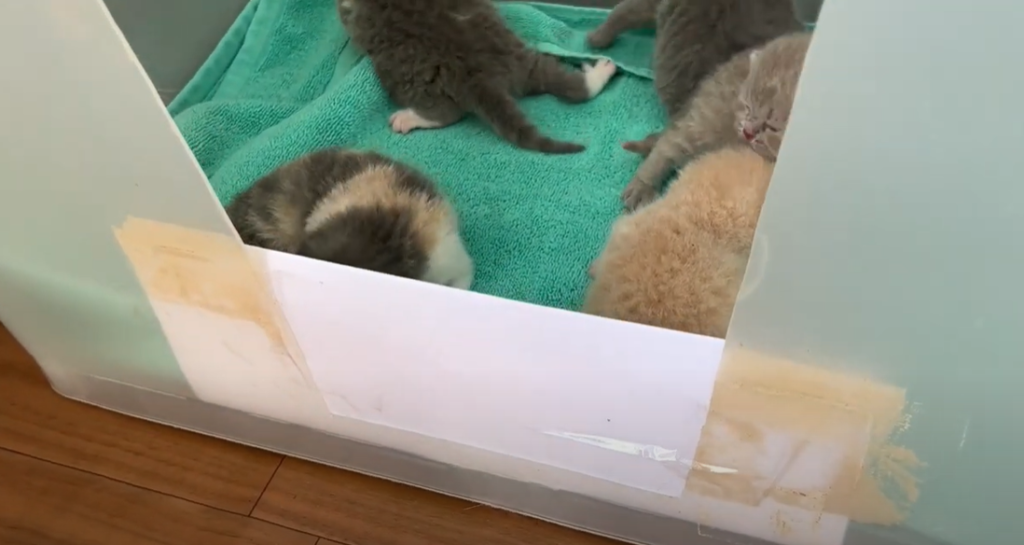
How soon can you touch kittens after birth?
You can touch kittens after birth, but be very gentle. Newborn kittens are fragile and their bones haven’t fully developed yet. Their mother will clean them, but you can gently stroke them with a soft cloth if you like. Just be careful not to hurt them or disturb the nest too much.
After the kittens have been cleaned by their mother, they will start to move around and explore their surroundings. At this stage, you can start to handle them more frequently, but still be gentle. They will start to play with each other and their mother at this stage too.
When can I Sterilize my female cat after giving birth?
You can typically sterilize your female cat around six weeks after she gives birth. This will help her heal properly and avoid any infection. You should also keep an eye on her incision site and make sure it is healing properly before you sterilize her. If you have any questions, be sure to ask your veterinarian.
Where should kittens sleep overnight?
If you have a new litter of kittens, they will need a warm, safe place to sleep. A good option is to set up a cardboard box with a soft towel or blanket inside. Place the box in a quiet area away from any drafts. You can also line the bottom of the box with newspaper if you prefer. Some people choose to use a heating pad placed underneath half of the box, but this is not required. Kittens should always have access to fresh water and dry food.
What should newborn kittens lay on?
After your cat has given birth, you’ll want to make sure that the area where she and her kittens are staying is clean and comfortable. This means having the right bedding for them. But what kind of bedding should newborn kittens lay on?
There are a few things to consider when choosing bedding for newborn kittens. First, you’ll want something that is soft and comfortable for them. Second, it should be easy to keep clean. And third, it should be safe for them to use.
Useful Video: How to Care for a Mama Cat & Kittens (3 Top Tips!)
Conclusion
We hope you found this article helpful in answering the question, “When to Change Bedding After Cat Gives Birth?” Remember, the most important thing is to make sure that your cat and her kittens are comfortable and safe. If you have any further questions or concerns, be sure to talk to your veterinarian. Thanks for reading!
References:
- https://www.littlelionfoundation.org/nursingmoms#
- https://askmycats.com/should-i-change-the-bedding-after-cat-gives-birth/
- https://persiancatstoday.com/when-to-change-bedding-after-cat-gives-birth/
- https://www.interviewarea.com/frequently-asked-questions/when-should-i-change-my-bedding-after-my-cat-gives-birth


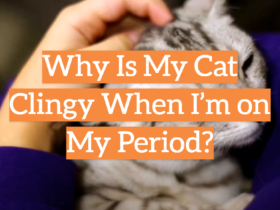


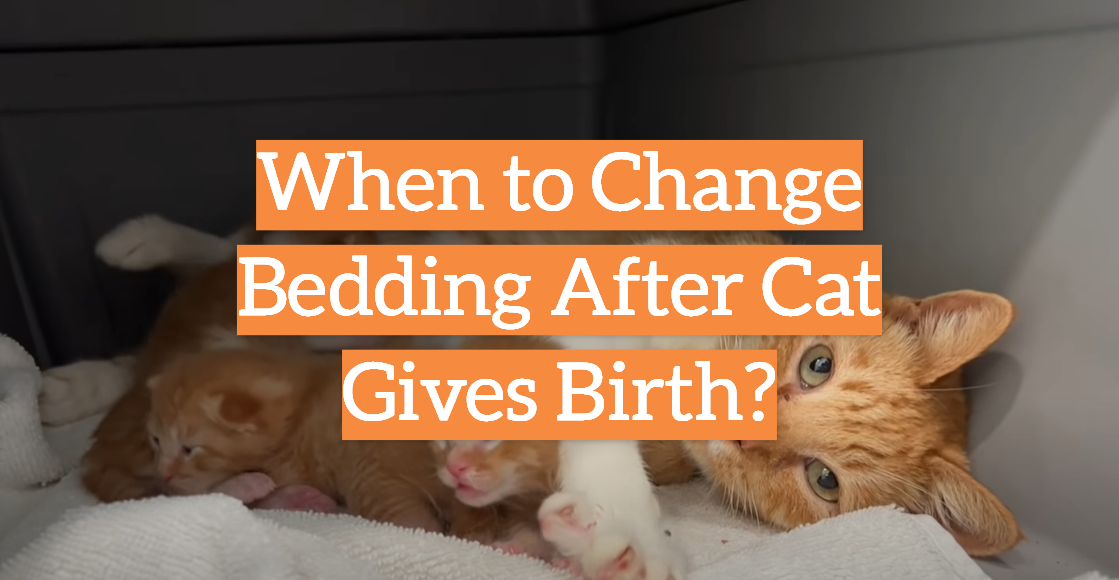




When my cat Mittens gave birth last spring, I was very cautious about changing her bedding too soon and stressing her out. I read that you should wait at least a week before changing it, to allow momma and babies time to bond and establish feeding. At about day 8, the bedding was quite soiled so I slowly changed a portion at a time over two days, while keeping mom and kittens to the clean side. Mittens seemed comfortable with this gradual change. By day 10, I had swapped out all the old bedding for fresh lining without disturbing the new family.
After my cat Belle had her litter last month, I didn’t change the bedding for almost two weeks. The kittens were very tiny and helpless at first and I didn’t want to risk separating them from Belle even for a few minutes. By day 12, the bedding smelled quite strong so I began the process of swapping it a little at a time. Belle watched me closely but didn’t seem stressed. I only did a small area each day for about 4 days until all the soiled bedding was replaced. Mother and babies did great through the gradual change.
When my darling calico Mimi had her first litter back in the fall, I was so worried about the bedding situation. I had read conflicting advice saying change it anywhere from 5 days to 2 weeks post-birth. Mimi was very protective of the kittens so I waited until day 11 to start exchanging the dirty linens for clean padding a section at a time. It was a slow process of a little each day, but it kept any disruption of the family to a minimum. By day 14, there was fresh, cozy bedding for all.
After my sweet tabby cat Rosie gave birth this past winter, I agonized over the best time to swap out her dirty birthing bedding. The kittens were so tiny and nursing round the clock those first couple weeks. Around day 10, the smell and soiled padding couldn’t be ignored any longer. Still, I only did a corner at a time, placing mom and babies elsewhere safe in the box during the switch. Rosie would pace and watch closely. I took it slow, a section each day, until all was fresh by day 13 without undue stress.
When my affectionate ragdoll Luna had her first litter last spring, I put off changing the bedding as long as I reasonably could. By day 11 the blankets were extremely soiled and smelly though. I was cautious, exchanging just a third of the padding at a time, keeping the box in the room so Luna could observe and putting her and babies back quickly. She was on high alert but not overly distressed. After four days, all the bedding was clean and the family snuggled in comfortable and content.
After my sweet diluted calico cat Lily birthed her kittens this summer, I didn’t attempt changing any bedding for almost two weeks. By then, the blankets were extremely dirty but the babies were also stronger and more mobile. Still, I took care, swapping out only a section or two of padding daily while mom supervised closely and babies slept in their temporary quarters. Slow and steady won the race, until fresh, sanitary bedding was complete by day 17 without unduly stressing the new family.
When my beloved tabby Hazel gave birth back in the springtime, I fretted over the best timing for changing her soiled birthing bedding. The kittens were so tiny and vulnerable that first week, and Hazel was protective and anxious. I managed to wait until day 12 when smells dictated action. Still I moved slowly, only doing part of the box bed each day, with Hazel watching me like a hawk the whole time. By day 16 we had achieved fresh blankets all around and everyone comfortably cuddled together on the new padding at last.
While my sweet calico Callie had kittens last summer, I agonized over the best time to change her dirty, soiled bedding. By day 10 the smell was overwhelming. Still, the kittens were tiny and nursing nonstop. I swapped just a portion of bedding at a time, moving mom and babies away while I worked. Callie watched anxiously as I slowly replaced all the blankets over a week. Finally by day 17 the family had fresh, clean padding.
After my loving tabby Lucy birthed her first litter this winter, I didn’t attempt changing any bedding for 12 days. But the stench couldn’t be ignored any longer no matter how vulnerable the kittens were. Ever so cautiously I exchanged a bit of linen daily while Lucy observed concerned. With great care not to stress mom or babies, I continued this routine each day until all was sanitized by day 16.
When my sweet dilute tortoiseshell Sadie had kittens this spring, I put off swapping the soiled bedding as long as possible. By 10 days even I couldn’t stand the smell! A little at a time over a week, I traded out dirty for fresh padding, as Sadie watched worriedly. Moving slowly and steadily to keep disruption minimal, the new family transitioned well to all clean blankets by day 17.
After my beloved orange tabby Buttercup birthed a lively litter this past fall, I was very hesitant to disturb the nest by changing bedding too quickly. But the stench won out by 2 weeks. Little by little each day, I exchanged dirty for clean lining as Buttercup supervised concerned. Slow and gentle was key; by day 18 all smelled fresh and mama was relaxed again.
When my silver tabby Lucy had her first kittens this summer, I put off changing bedding for over a week, worried I’d stress her. By day 12 even I couldn’t stand the odor longer. I swapped linen out bit by bit daily as Lucy observed closely. She seemed comfortable with this gradual change. In the end everyone transitioned well over a week to fresh clean padding.
After my calico Mittens birthed a large litter in the springtime, the bedding situation was worrying. The kittens were so vulnerable that first stretch. I managed to hold off until day 11 when smells said it was time. Watchful of mom’s anxiety, I carefully exchanged only sections of blanket each day. We finally achieved fully clean bedding by day 15 without disturbing the feeding and bonding.
When my tabby Jojo had her first kittens last winter, I didn’t dare change the bedding for the first couple weeks even though it became foul-smelling. Jojo was so protective, the kittens still shaky. Starting day 14 I swapped a portion of fabric each day as Jojo observed concerned. Moving slowly and calmly was key; by day 19 all smelled fresh and family life was comfortable.
After my dilute calico Panda birthed a large litter this summer, I put off changing bedding for over a week, not wanting to upset delicate routines. But eventually the smell meant I had to act. Little by little I replaced blankets each day as Panda kept close watch. With great patience and care, after a week of gradual change all was clean-smelling and harmony maintained.